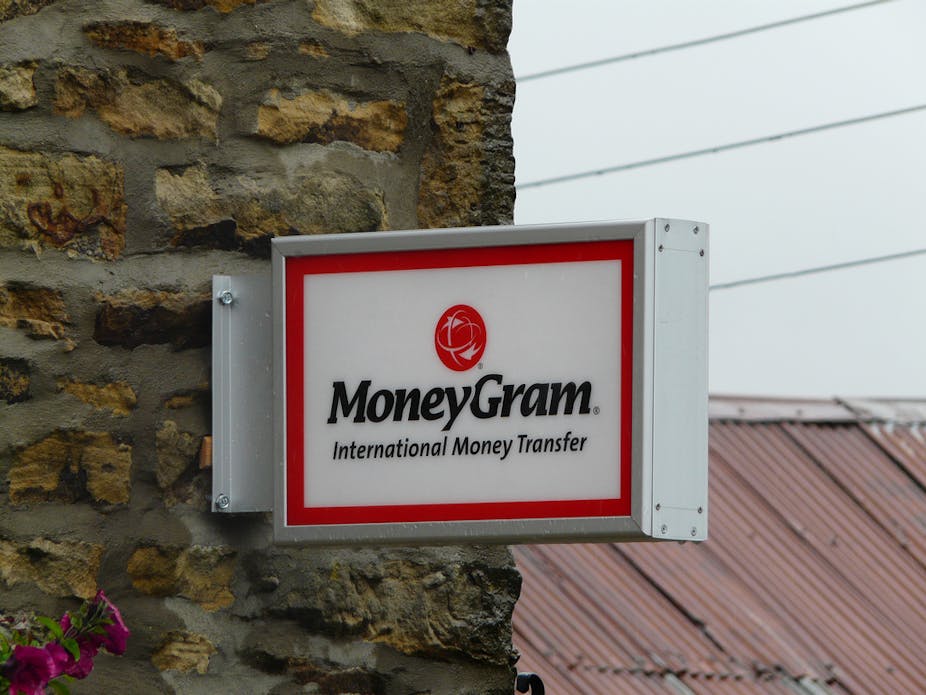Next week, Australian bank Westpac will become the last of the big four banks to stop serving money transfer operators, amid concerns about breaching laws on money laundering and terrorist financing.
There is the whiff of the illicit about sending money overseas in Anglo-American countries. Sending money to parents and siblings does not feel natural, for it is not a cultural practice. Parents and grandparents give money to children and grandchildren, but money seldom flows back up the generations. Some of the regulatory practices to curb sending money overseas stem from this cultural presupposition.
These assumptions have also made it difficult for organisations to see the importance of remittances. In 2003 Dilip Ratha put remittances on the map. He found that remittances to the Philippines were 51 times higher than the International Monetary Fund estimated.
Ratha is an Indian migrant to the United States and used to send money to his family in Orissa. He is now the lead economist and manager of the Migration and Remittances Development Prospects Group at the World Bank.
Despite the Anglo worldview, the global norm is to share money within the family. In most parts of Asia, Africa, Latin America and the Pacific, money is routinely shared both ways between parents and children.
When my mother was alive, I sent money home to India. I followed my sisters who had sent money home from Mumbai and New York. Their money helped put food on the table, for we were a refugee family.
By the time I began earning overseas, my mother had retired as a principal of a university college. She could manage. I sent money to show love and care. My mother would boast of receiving money, for it showed she had a filial child.
In 2014 remittances to developing countries are projected to reach $US435 billion, more than three times the amount of overseas aid. Remittances are greater than foreign direct investment in countries except for China.
In many countries, remittances can be up to 70% of the household income. They pay for food and housing, for the children’s education and the family’s health.
Remittances are important for the country too as they are more stable than private equity flows. They are an important percentage of Gross Domestic Product (GDP). In 2012, formal remittances accounted for 12.2% of GDP in Bangladesh, 23.2% in Samoa and 12.6% in Tonga, according to the World Bank. The figure for Vietnam in 2011 was 6.3%.
Money laundering and funding terrorism happens through all payment channels. Some of the most dramatic cases have happened through banks. Shutting down the remitting organisations’ bank accounts and hence shutting down their operations will only mean we lose transparency and the audit trail.
Ensuring transparency means that regulators, formal financial institutions and money transfer organisations can work together. They can devise signals that track and curtail money laundering and funding of terrorism.
Bank self-interest?
It is difficult not to suspect banks of a self-serving motive in withdrawing their services from registered remitting organisations. Commercial banks are often the most expensive remittance channels.
World Bank figures show the cost of sending money from Australia via banks, particularly to remittance-dependent countries in the Pacific, is more than twice the percentage charged by money transfer operatives (MTOs). The bank average cost for sending A$200 to Samoa is 18.38% compared to MTOs at 7.64%. For Tonga the average percentage costs are 18.26% versus 8.78%.
Closing down non-bank money remittance channels will leave families in Australia, Asia, Africa and the Pacific without the means of lending or receiving support. The money transfers will not stop, because they are deeply embedded in the role of money as a medium of relationship. Most likely the transfers will move to informal channels.
This is contrary to the agreed aims of G20. The struggle has been to lower the cost of remittances from the present average of 7.9% to 5%. There has also been a steady push to increase the percentage of formal remittances. At present informal channels are estimated to account for 45-80% of all remittances.
The high cost of remittances and onerous regulation are leading to speculation, particularly in Africa, that cryptocurrencies like Bitcoin will reduce the cost of remittances and increase access. Bitpesa in Kenya advertises a 3% transfer fee. Despite the promotion, there is little evidence or study of use on the ground. But alternatives that bypass the banking channels are looking increasingly attractive to those sending and receiving money across borders.
What then for money laundering and funding of terrorism?

